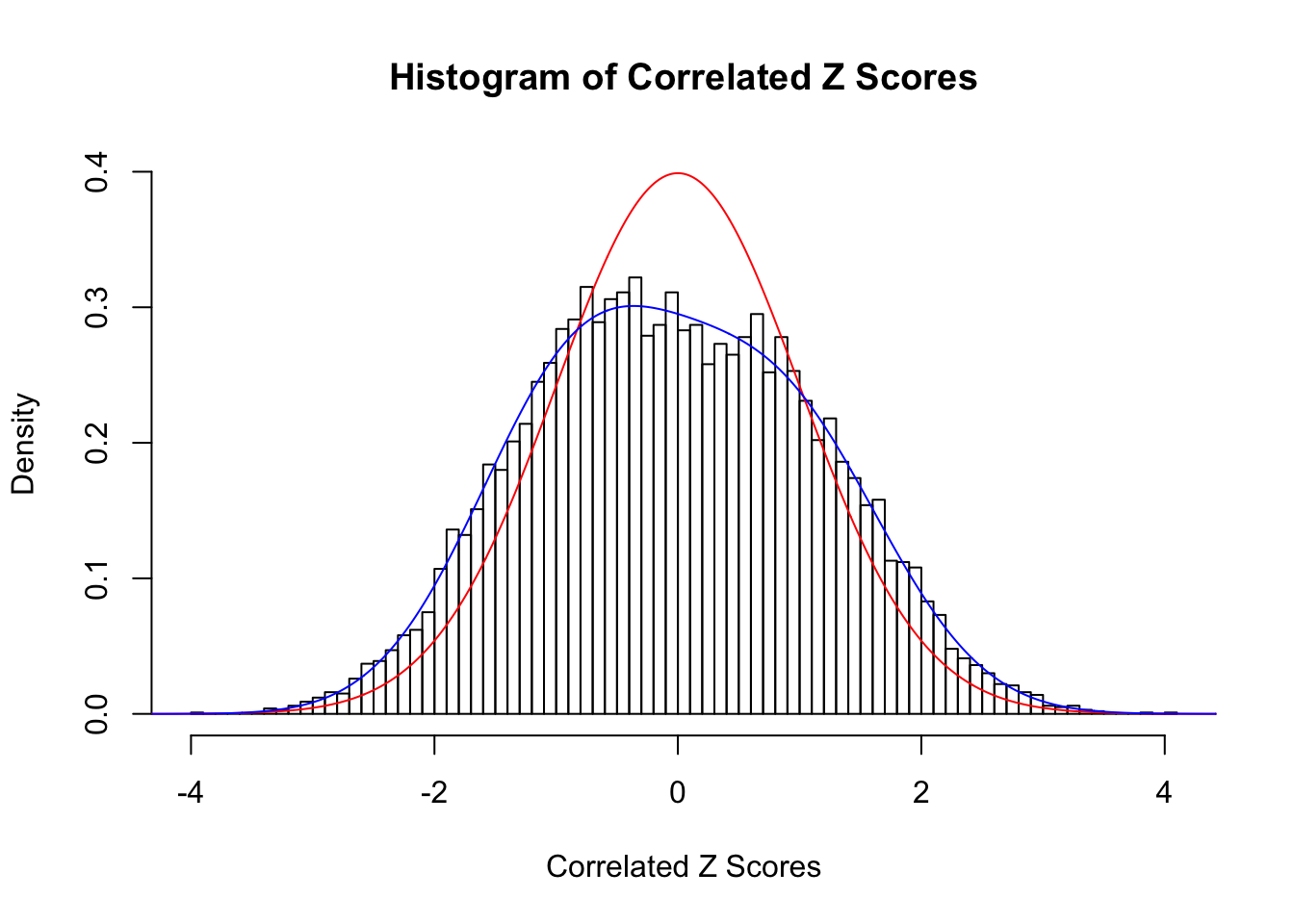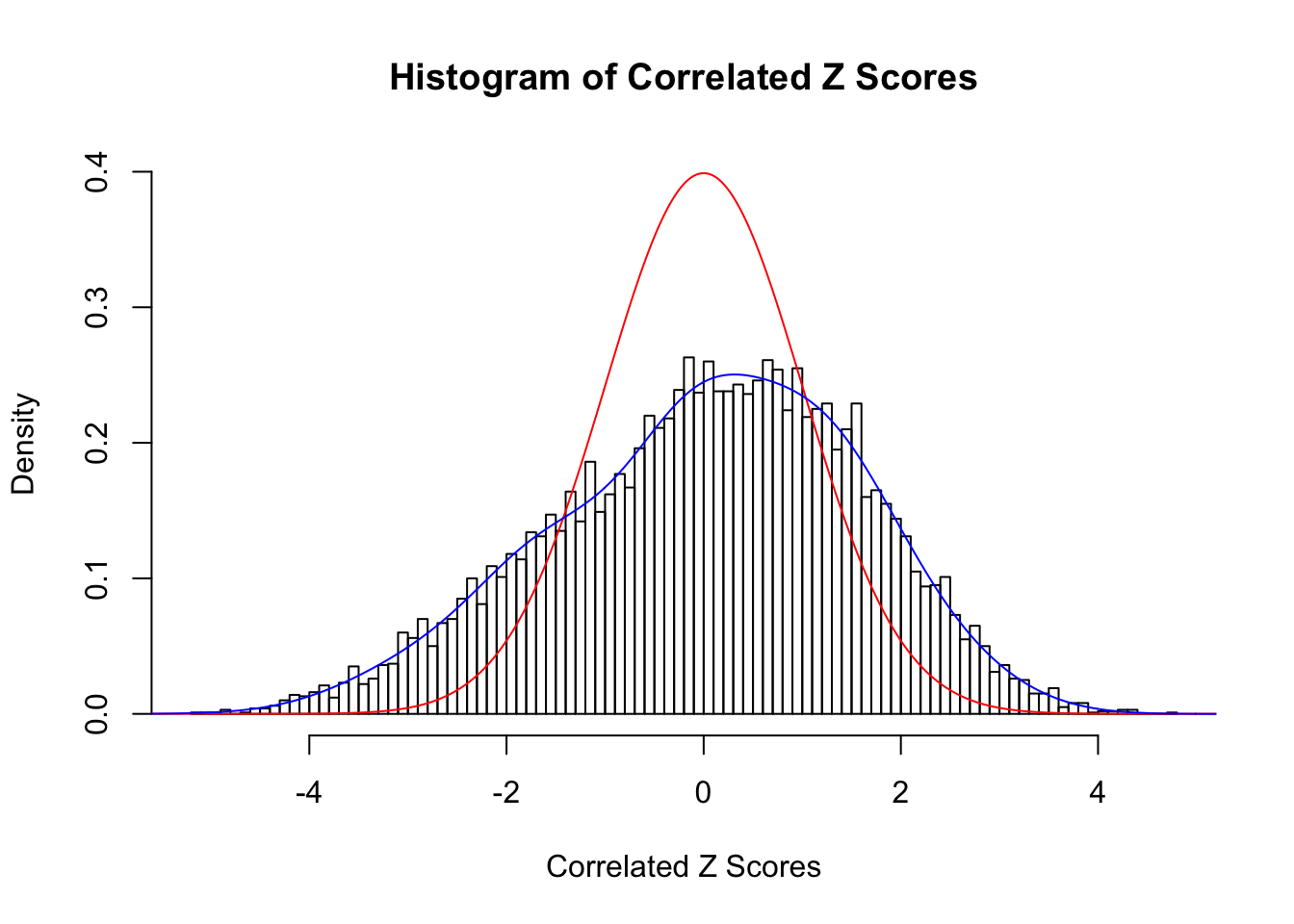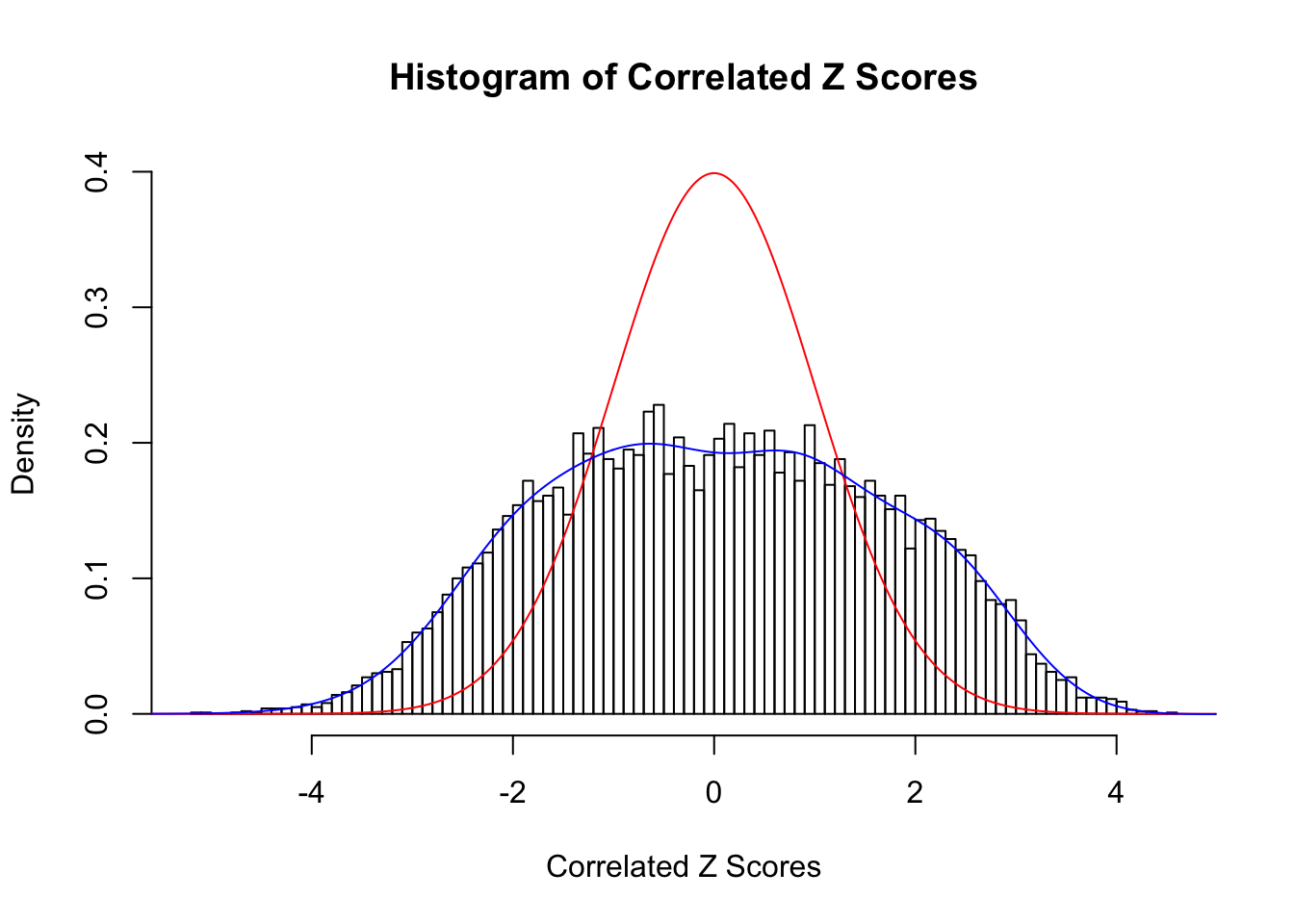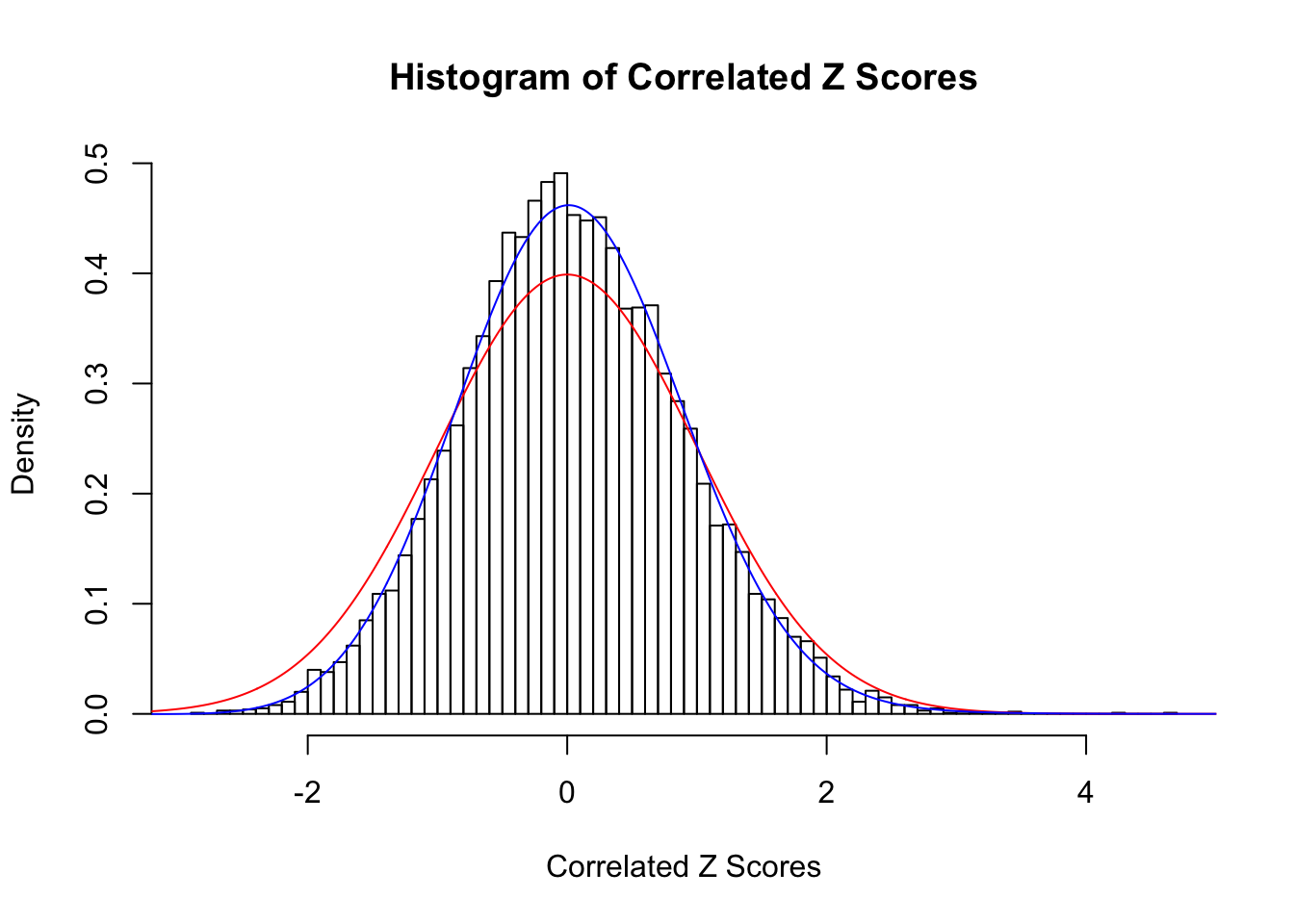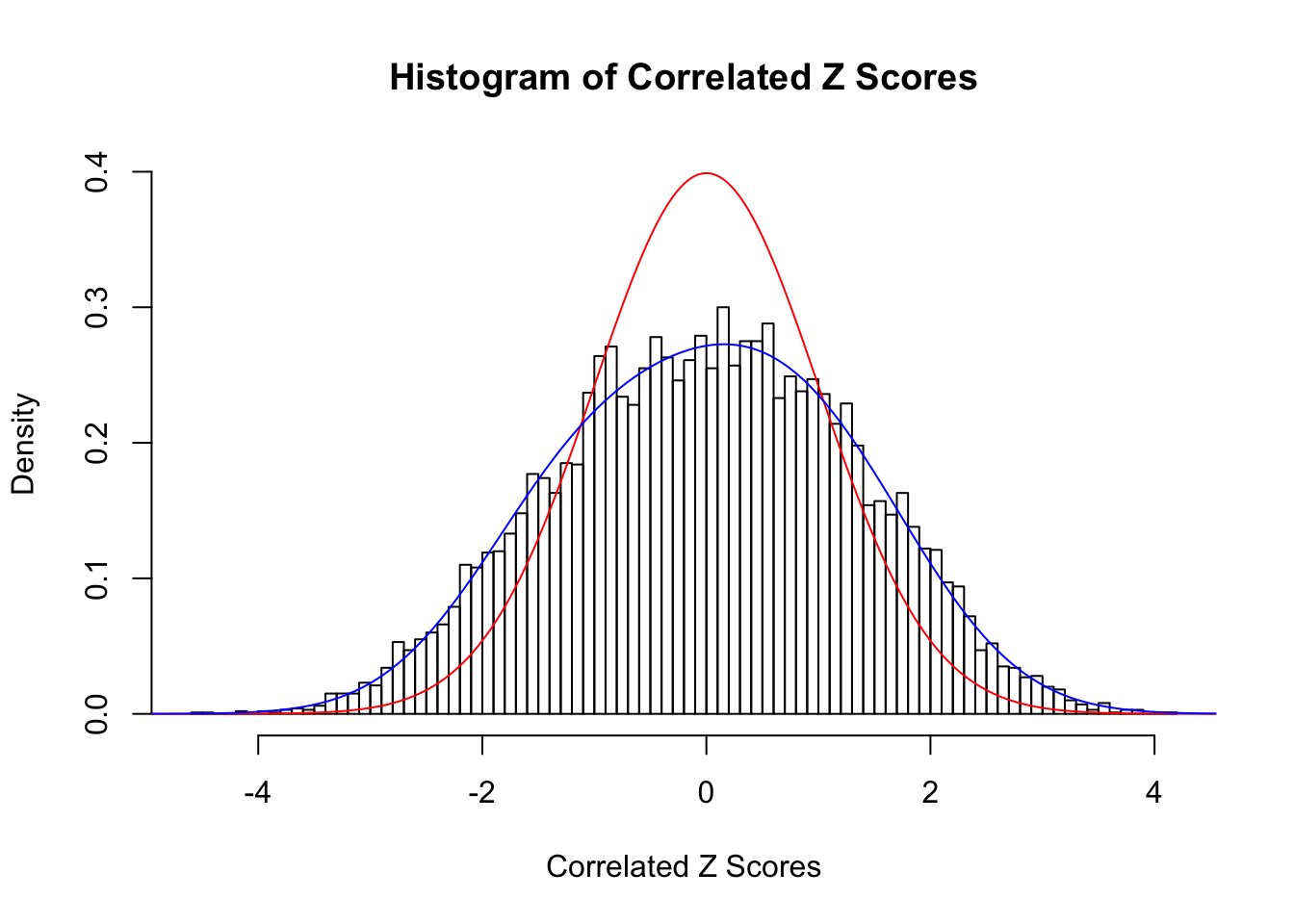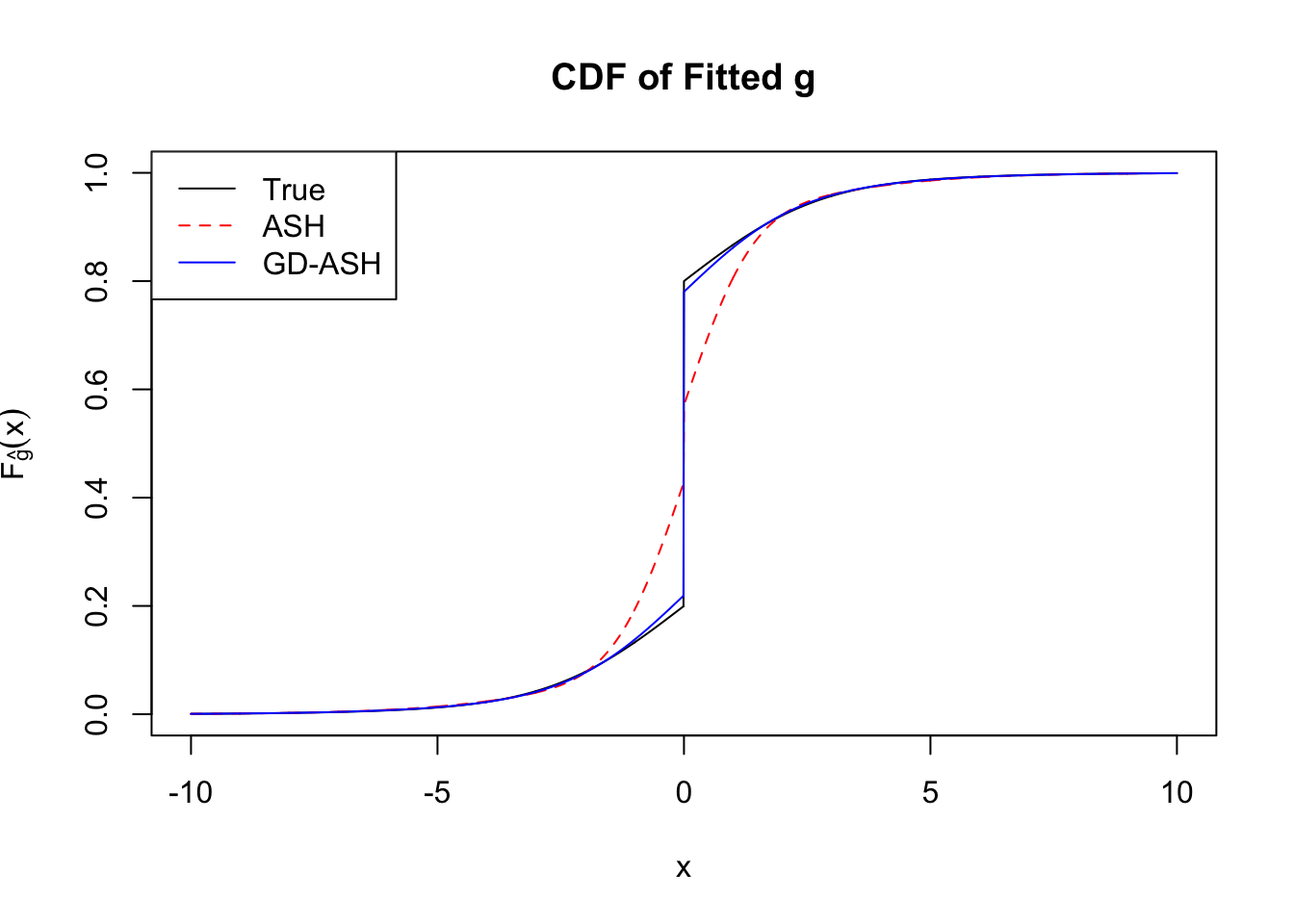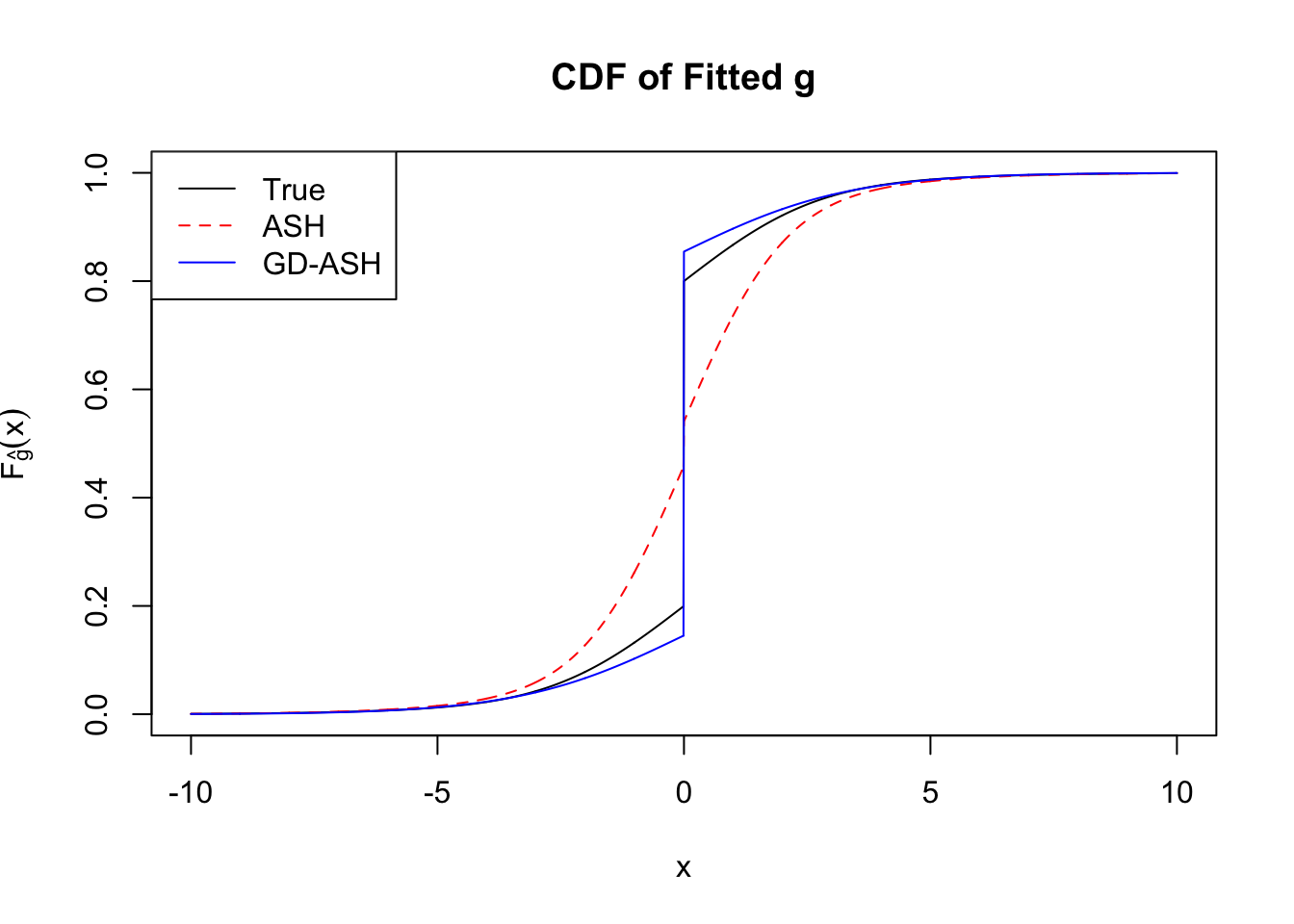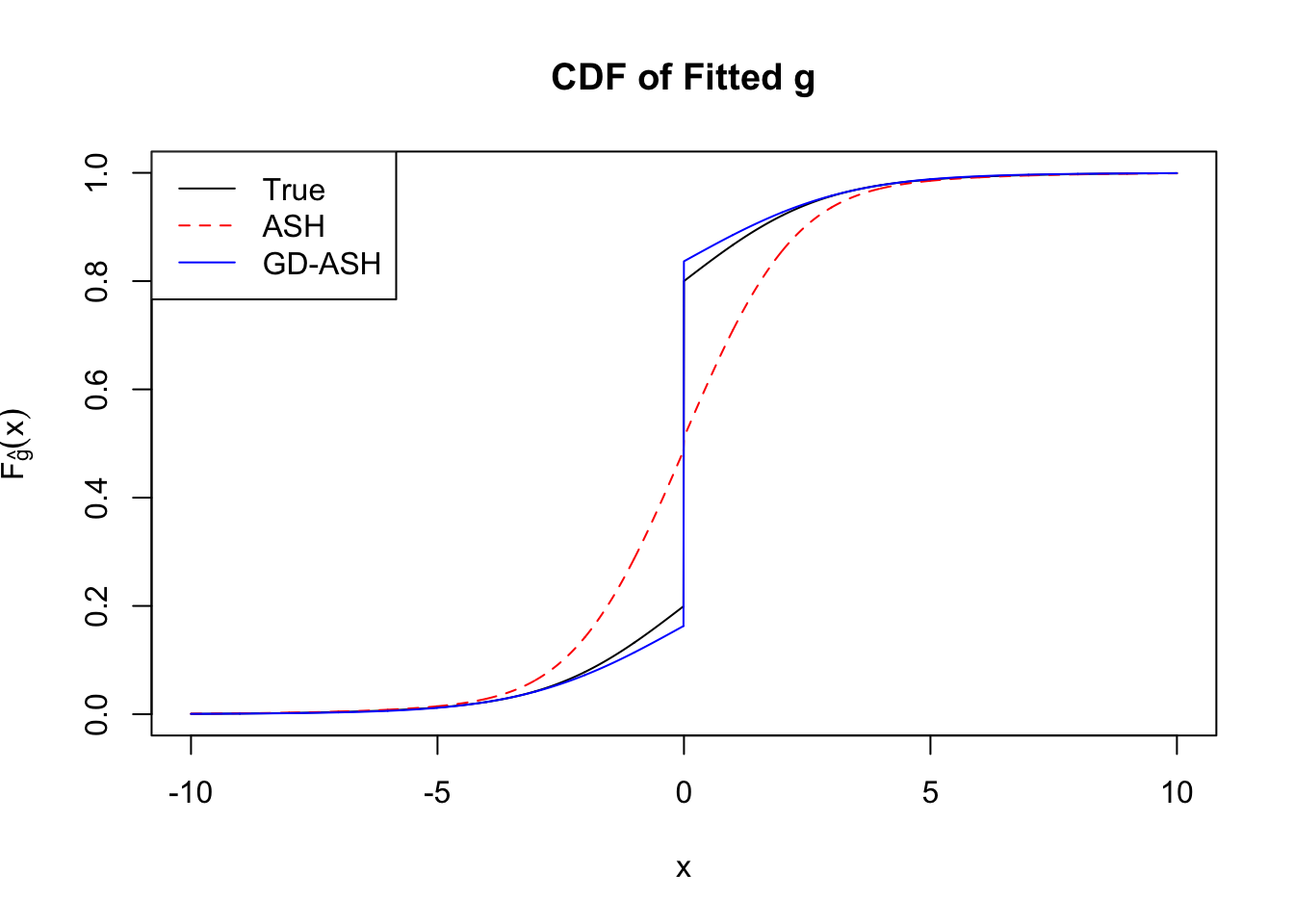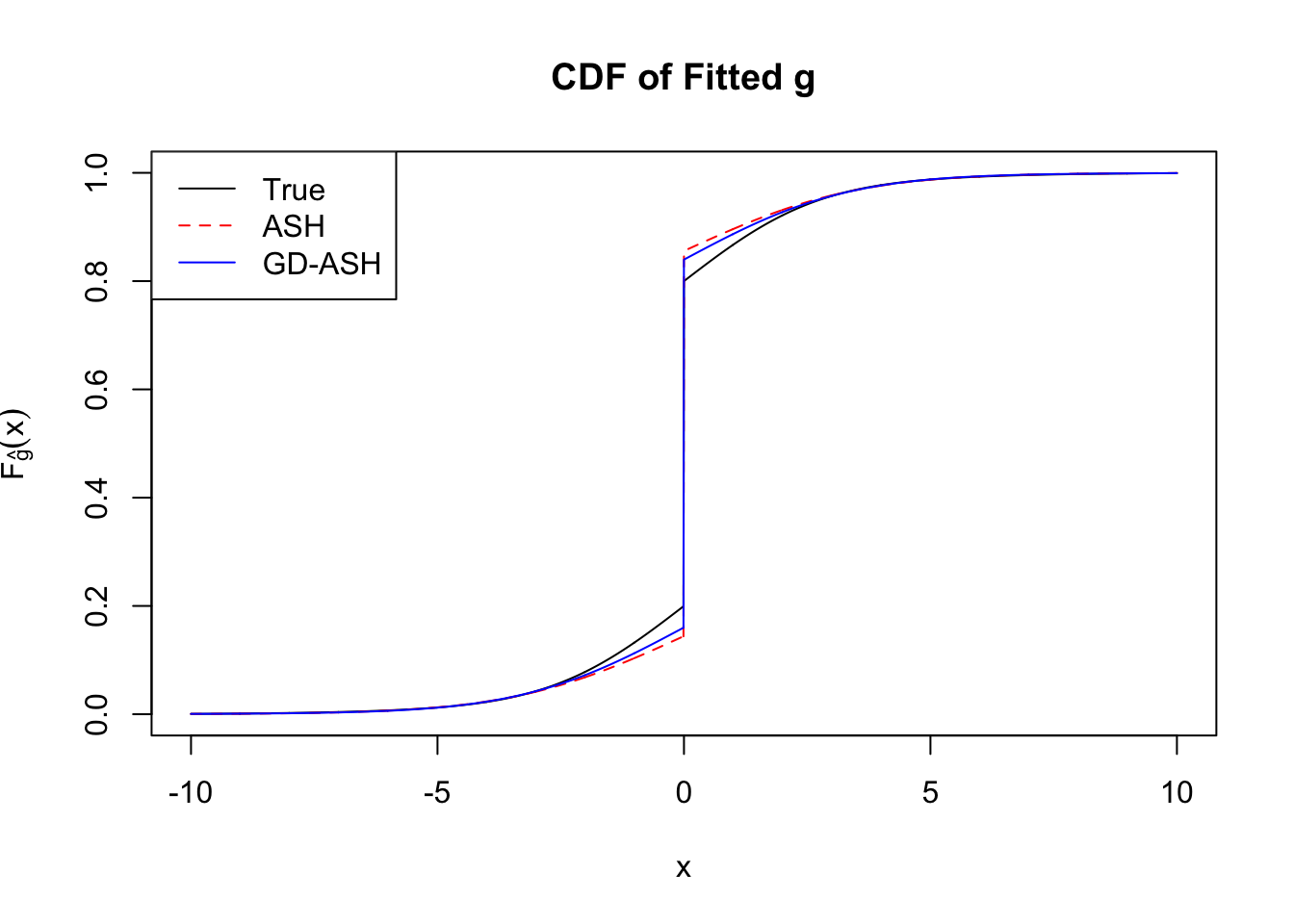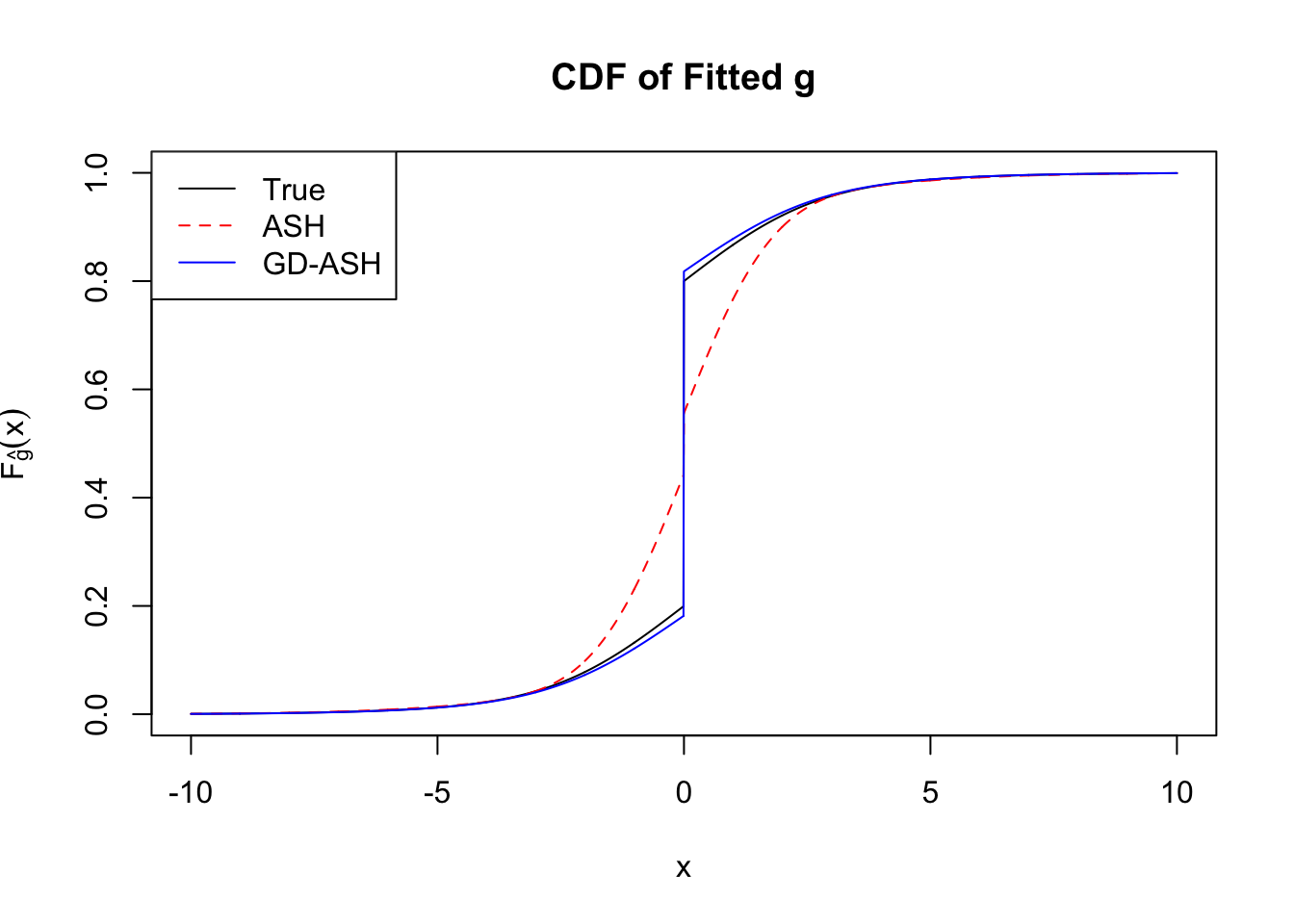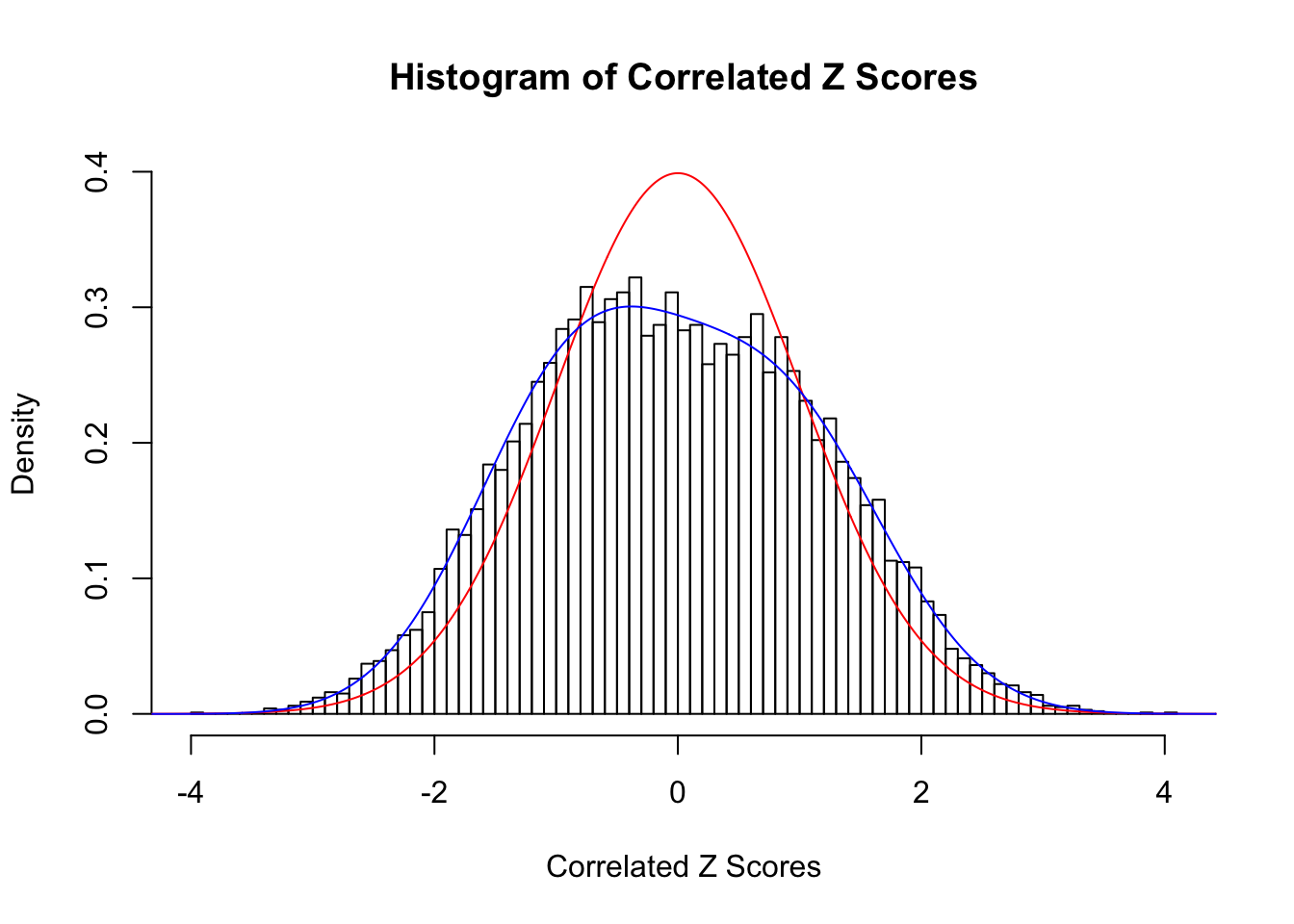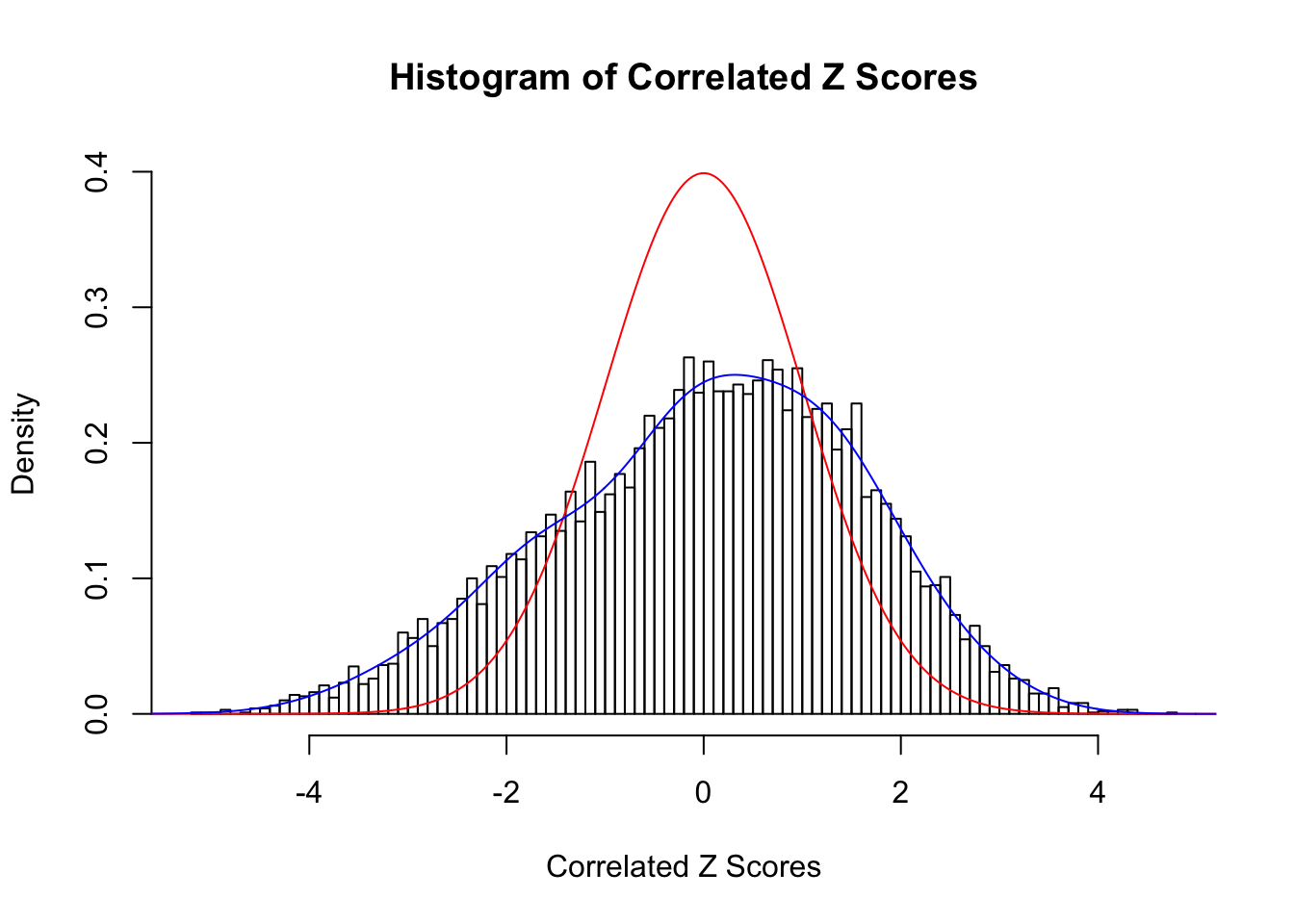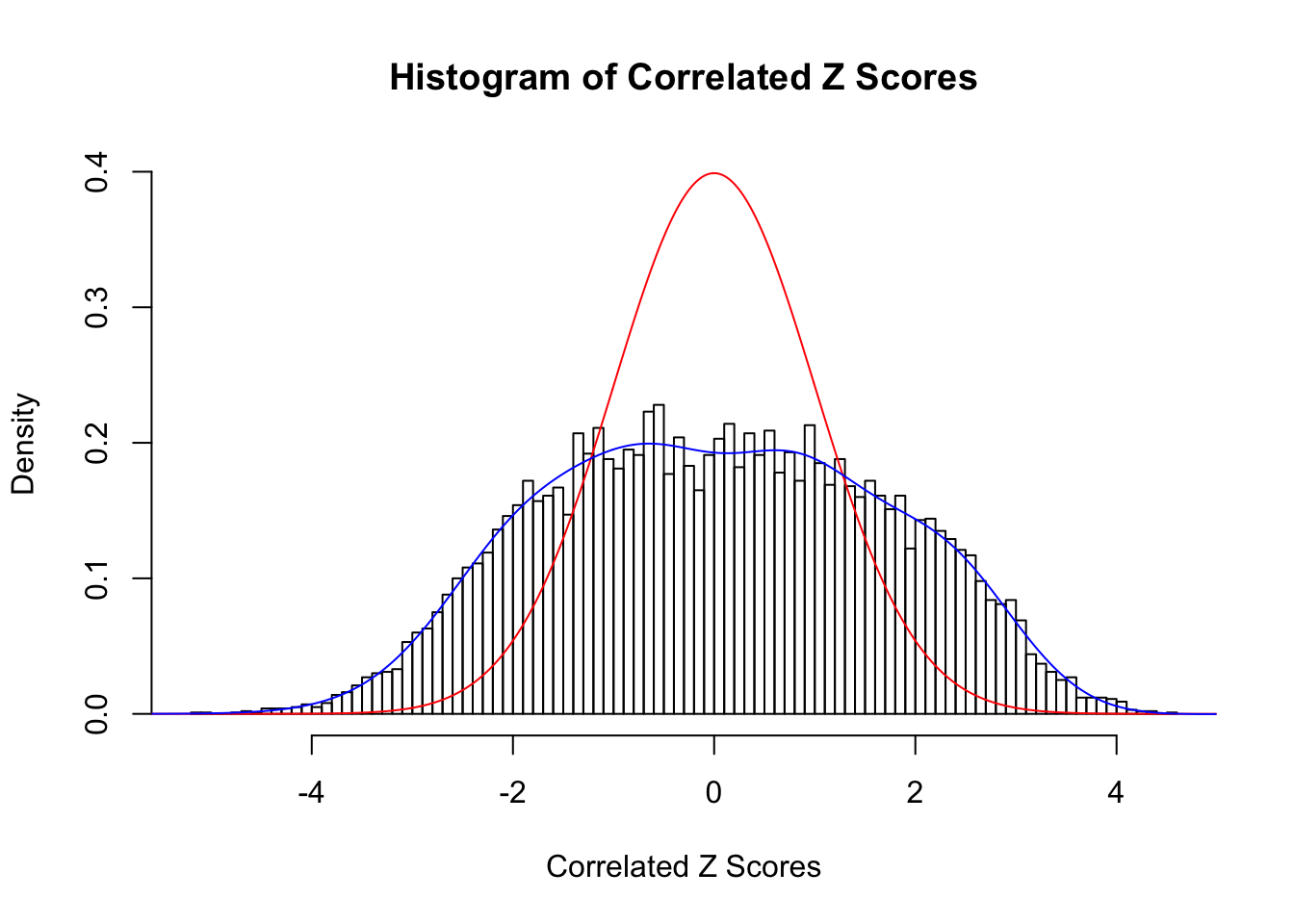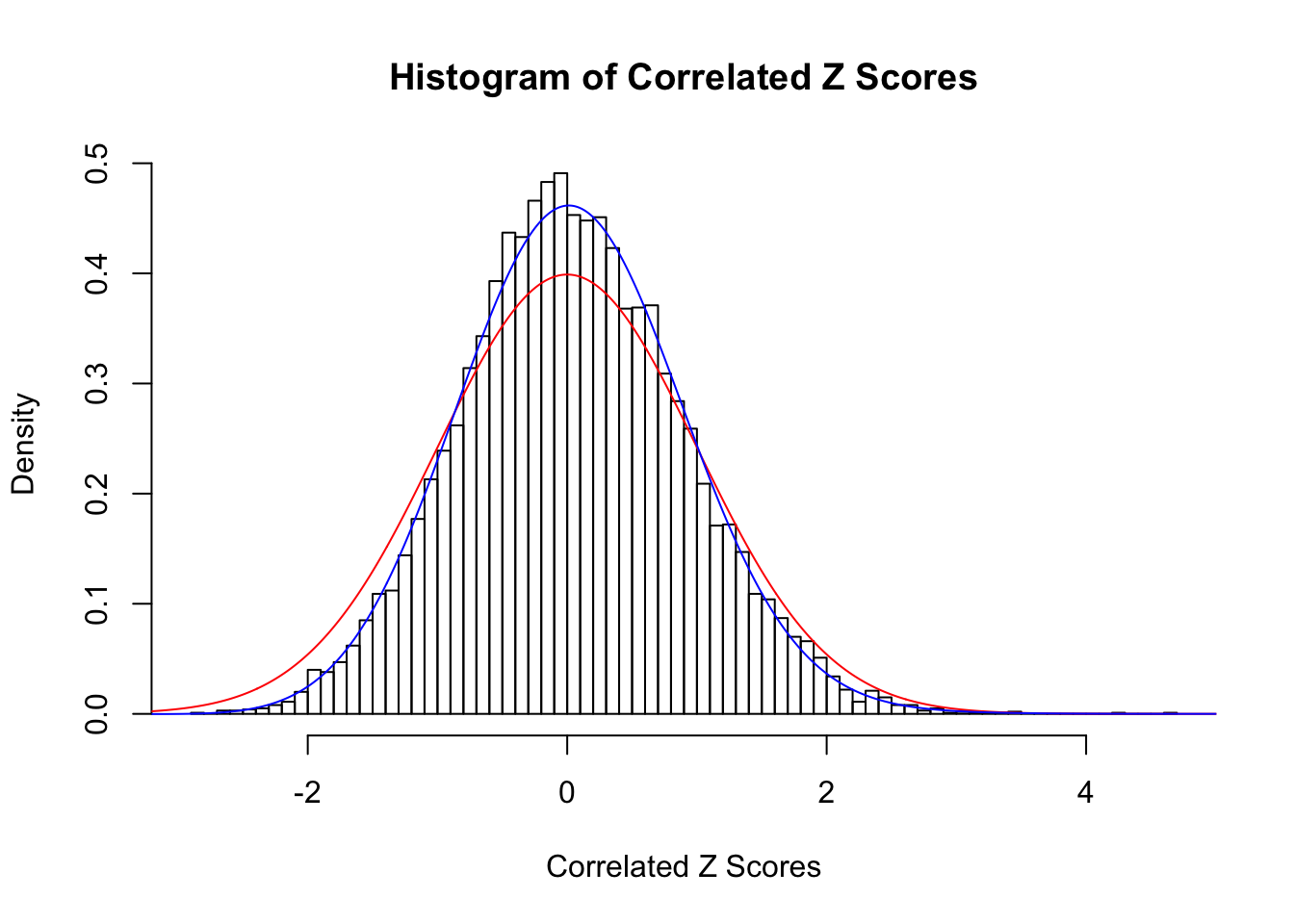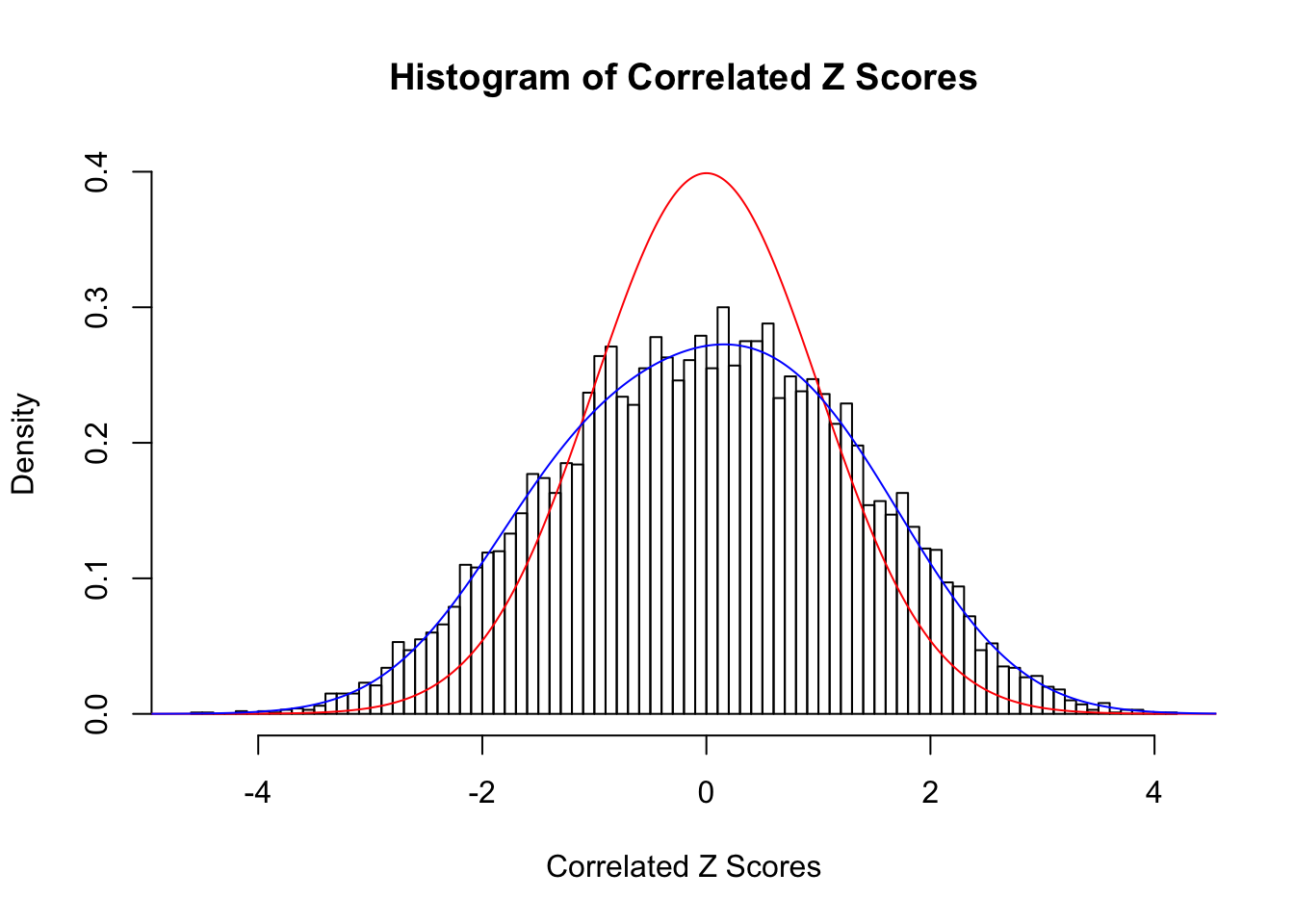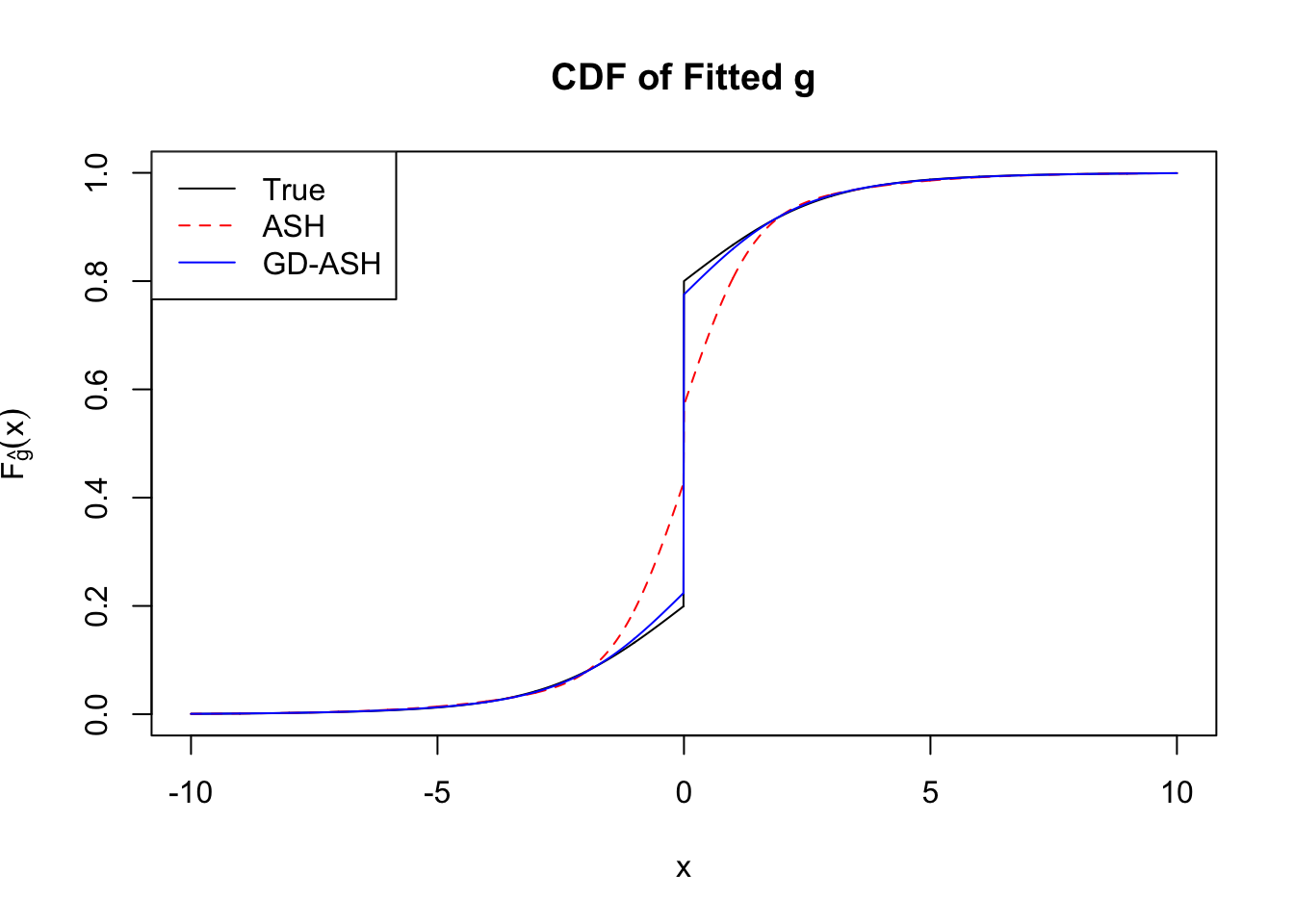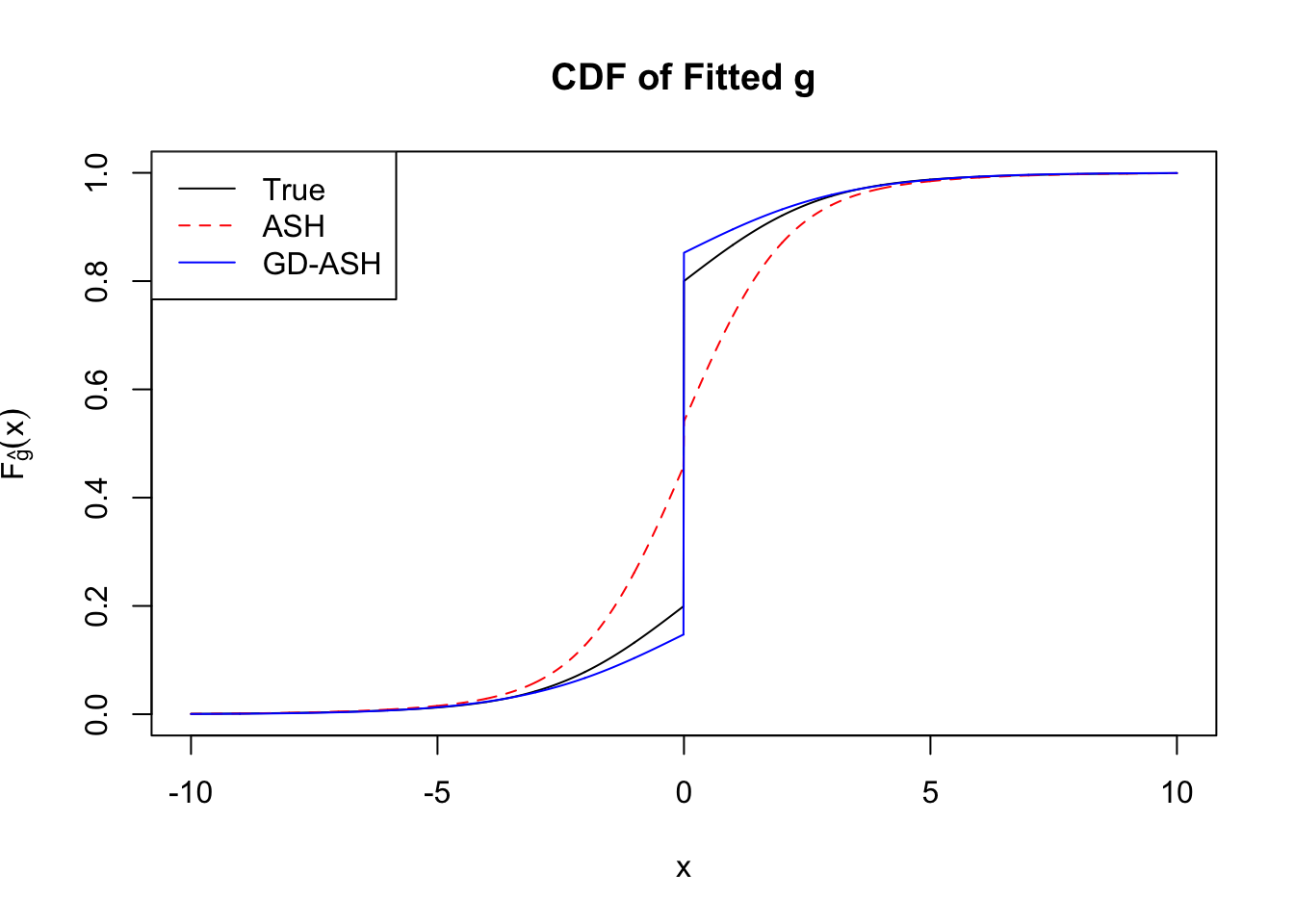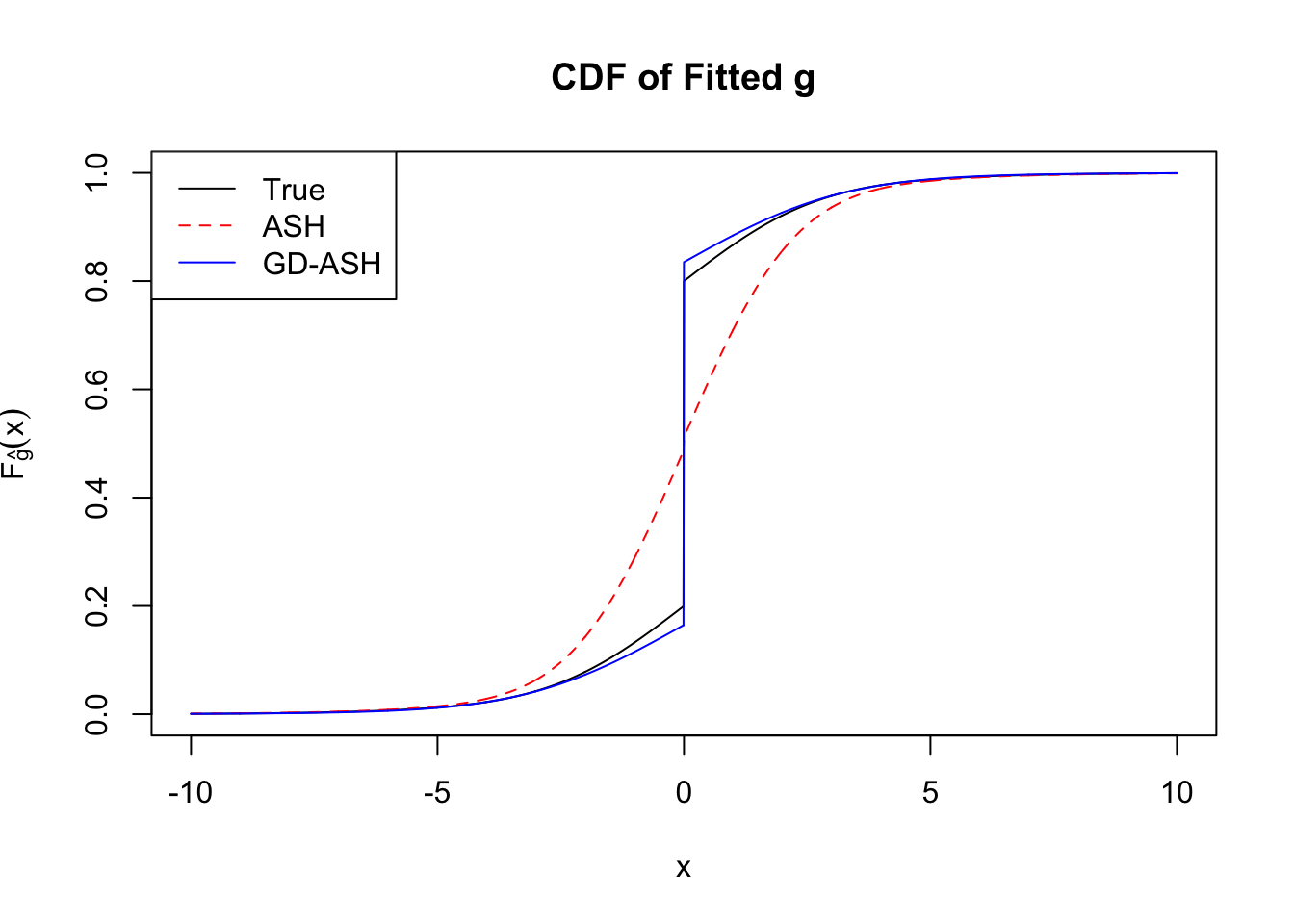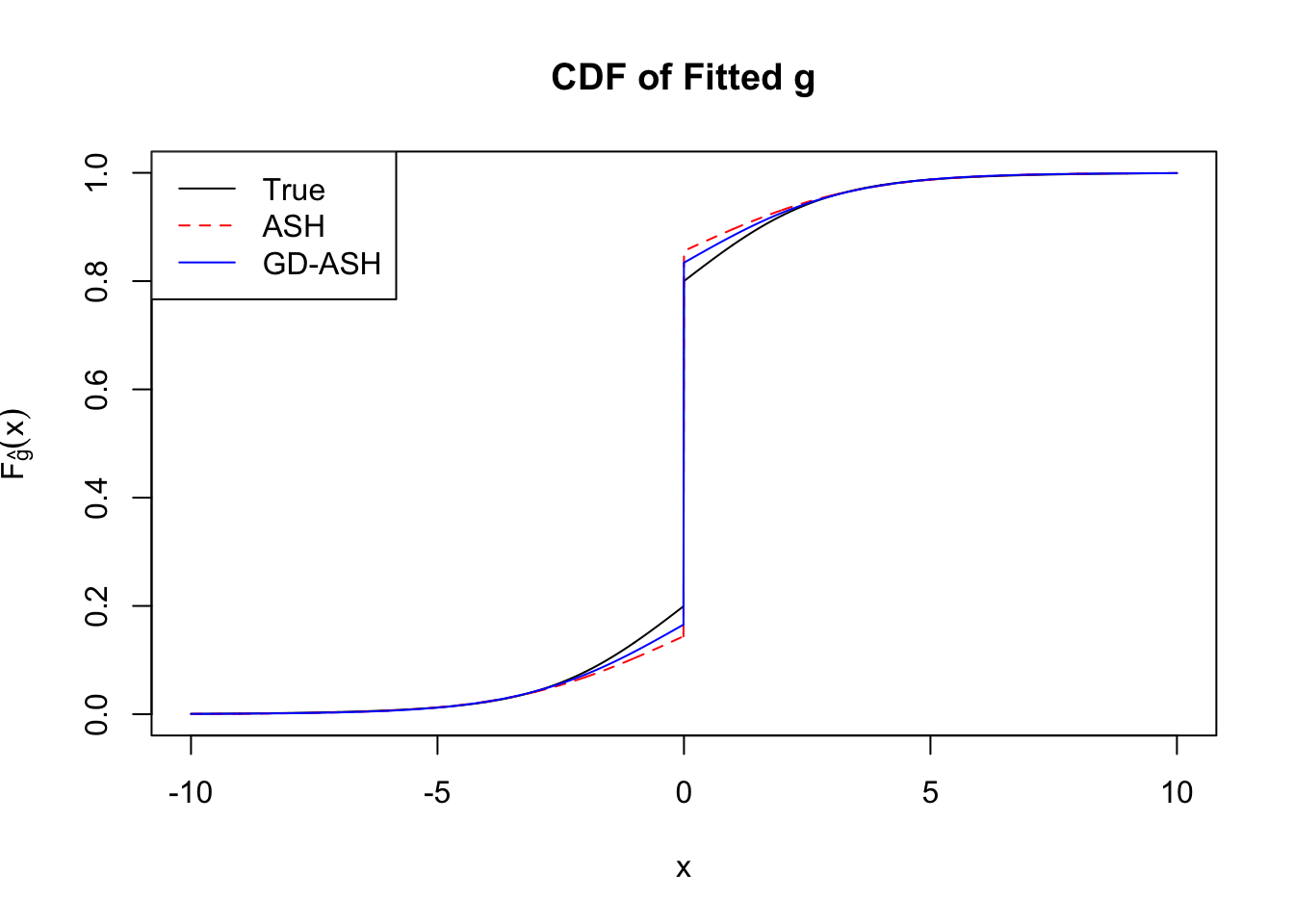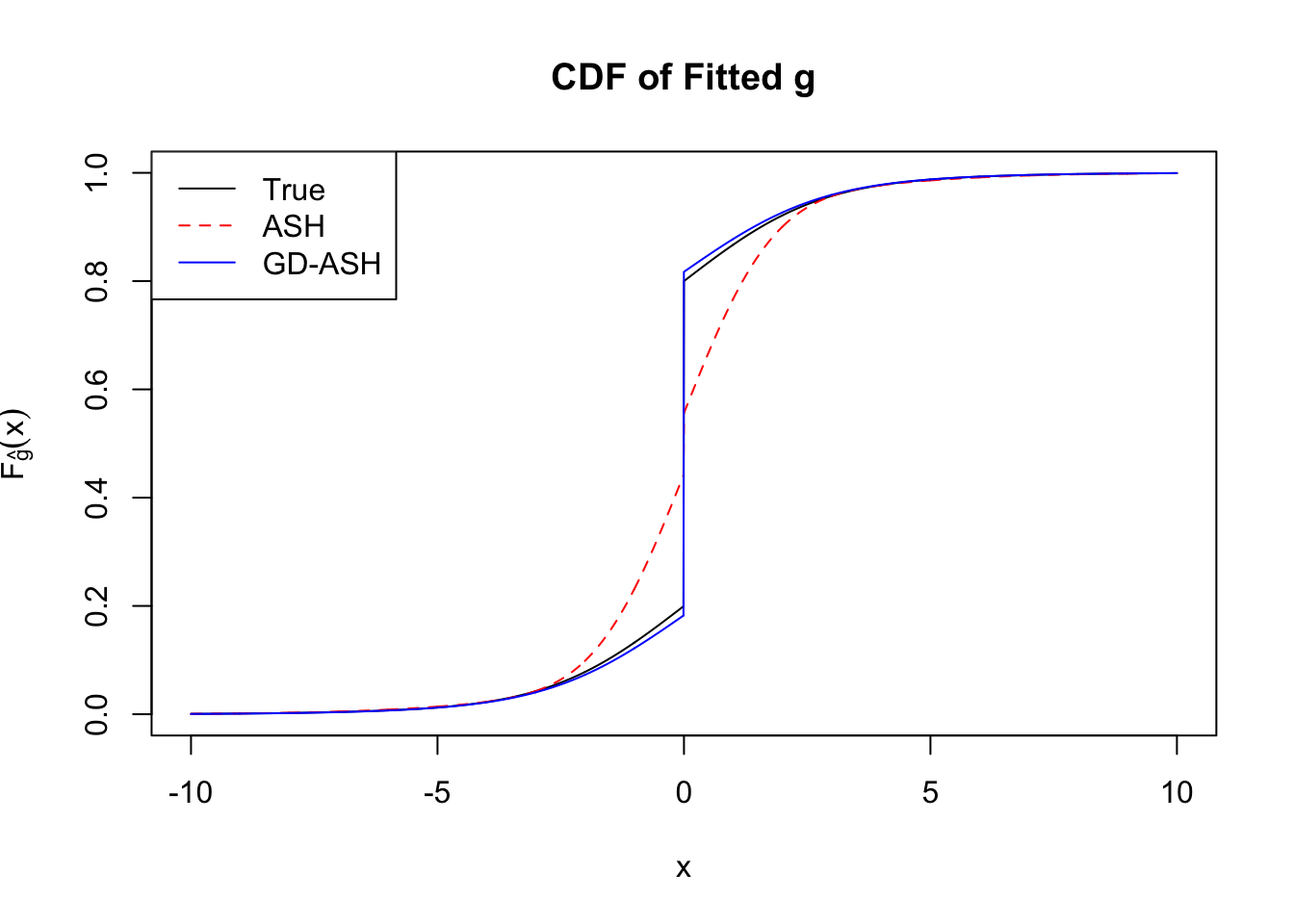Improvement on Implementation with Rmosek: Primal and Dual
Lei Sun
2017-05-07
Last updated: 2017-12-21
Code version: 6e42447
Introduction
We are experimenting different ways to improve the performance of Rmosek, using typical data sets of correlated \(z\) scores.
z <- read.table("../output/z_null_liver_777.txt")sel <- c(32, 327, 355, 483, 778)
ord <- c(4, 9, 9, 4, 4)source("../code/gdash.R")Algorithm and variations
Recall that our biconvex optimization problem is as follows.
\[ \begin{array}{rl} \min\limits_{\pi,w} & -\sum\limits_{j = 1}^n\log\left(\sum\limits_{k = 1}^K\sum\limits_{l=1}^L\pi_k w_l f_{jkl} + \sum\limits_{k = 1}^K\pi_kf_{jk0}\right) - \sum\limits_{k = 1}^K\left(\lambda_k^\pi - 1\right)\log\pi_k + \sum\limits_{l = 1}^L\lambda_l^w\phi\left(\left|w_l\right|\right) \\ \text{subject to} & \sum\limits_{k = 1}^K\pi_k = 1\\ & \sum\limits_{l=1}^L w_l \varphi^{(l)}\left(z\right) + \varphi\left(z\right) \geq 0, \forall z\in \mathbb{R}\\ & w_l \text{ decay reasonably fast,} \end{array} \] where \(- \sum\limits_{k = 1}^K\left(\lambda_k^\pi - 1\right)\log\pi_k\) and \(+ \sum\limits_{l = 1}^L\lambda_l^w\phi\left(\left|w_l\right|\right)\) are to regularize \(\pi_k\) and \(w_l\), respectively.
This problem can be solved iteratively. Starting with an initial value, each step two convex optimization problems are solved.
With a given \(\hat w\), \(\hat\pi\) is solved by
\[ \begin{array}{rl} \min\limits_{\pi} & -\sum\limits_{j = 1}^n\log\left(\sum\limits_{k = 1}^K\pi_k \left(\sum\limits_{l=1}^L \hat w_l f_{jkl} + f_{jk0}\right)\right) - \sum\limits_{k = 1}^K\left(\lambda_k^\pi - 1\right)\log\pi_k\\ \text{subject to} & \sum\limits_{k = 1}^K\pi_k = 1 \ ,\\ \end{array} \]
which is readily available with functions in cvxr.
Meanwhile, with a given \(\hat\pi\), the optimization problem to obtain \(\hat w\) becomes
\[ \begin{array}{rl} \min\limits_{w} & -\sum\limits_{j = 1}^n\log\left(\sum\limits_{l=1}^Lw_l\left(\sum\limits_{k = 1}^K\hat\pi_k f_{jkl}\right) + \sum\limits_{k = 1}^K\hat\pi_kf_{jk0}\right) + \sum\limits_{l = 1}^L\lambda_l^w \phi \left(\left|w_l\right|\right) \\ \text{subject to} & \sum\limits_{l=1}^L w_l \varphi^{(l)}\left(z\right) + \varphi\left(z\right) \geq 0, \forall z\in \mathbb{R}\\ & w_l \text{ decay reasonably fast.} \end{array} \] The two constraints are important to prevent numerical instability. Yet they are not readily manifested as convex. Ideally, the regularization \(\sum\limits_{l = 1}^L\lambda_l^w\phi\left(\left|w_l\right|\right)\) would be able to capture the essence of these two constaints, and at the same time maintain the convexity. Different ideas will be explored.
In this part, we’ll mainly work on the “basic form” of the \(w\) optimization problem; that is, the optimization problem without regularization \(\sum\limits_{l = 1}^L\lambda_l^w\phi\left(\left|w_l\right|\right)\).
In the following, we’ll take a look at the basic form in its primal and dual formulations, optimized by w.mosek() and w.mosek.primal functions. First, they are applied to the correlated null, and their performance can be compared with the previous implementation by cvxr. Then, they are applied to the simulated non-null data sets, and the results are compared with those obtained by ASH, as well as the truth.
Basic form: primal
In its most basic form, the \(w\) estimation problem is as follows.
\[ \begin{array}{rl} \min\limits_{w} & -\sum\limits_{j = 1}^n \log\left(\sum\limits_{l=1}^Lw_l a_{jl} + a_{j0}\right) \\ \text{subject to} & \sum\limits_{l=1}^Lw_l a_{jl} + a_{j0} \geq 0, \forall j \ .\\ \end{array} \] Let the matrix \(A = \left[a_{jl}\right]\), the vector \(a = \left[a_{j0}\right]\), and we have its equivalent form,
\[ \begin{array}{rl} \min\limits_{w, g} & -\sum\limits_{j = 1}^n \log\left(g_j\right) \\ \text{subject to} & Aw + a = g \\ & g \geq 0\ . \end{array} \]
This problem can be coded by Rmosek as a “separable convex optimization” (SCOPT) problem.
Basic form: dual
The primal \(w\) optimization problem has \(n + L\) variables and \(n\) constraints. When \(n\) is large, such as \(n = 10K\) in our simulations, the time cost is usually substantial. As the authors of REBayes pointed out, it’s better to work on the dual form, which is
\[ \begin{array}{rl} \min\limits_{v} & -\sum\limits_{j = 1}^n \log\left(v_j\right) + a^Tv \\ \text{subject to} & A^Tv = 0 \\ & v \geq 0\ . \end{array} \] The dual form has \(n\) variables and more importantly, only \(L\) constraints. As \(L \ll n\), the dual form is far more computationally efficient.
Rmosek provides optimal solutions to both primal and dual variables, so \(\hat w\) is readily available when working on \(v\) optimization. But we need to be careful on which dual variables to use, such as $sol$itr$suc, $sol$itr$slc, or others.
Conclusion
Implementation by Rmosek can fully reproduce the results obtained by cvxr. Moreover, the dual form gives the same results as the primal dorm does, with only a fraction of time.
It seems hopeful that we’ll find a key to successfully tackle correlation in simultaneous inference, which has eluded Prof. Brad Efron for more than a decade.
Session information
sessionInfo()R version 3.4.3 (2017-11-30)
Platform: x86_64-apple-darwin15.6.0 (64-bit)
Running under: macOS High Sierra 10.13.2
Matrix products: default
BLAS: /Library/Frameworks/R.framework/Versions/3.4/Resources/lib/libRblas.0.dylib
LAPACK: /Library/Frameworks/R.framework/Versions/3.4/Resources/lib/libRlapack.dylib
locale:
[1] en_US.UTF-8/en_US.UTF-8/en_US.UTF-8/C/en_US.UTF-8/en_US.UTF-8
attached base packages:
[1] stats graphics grDevices utils datasets methods base
other attached packages:
[1] Rmosek_8.0.69 PolynomF_1.0-1 CVXR_0.94-4 REBayes_1.2
[5] Matrix_1.2-12 SQUAREM_2017.10-1 EQL_1.0-0 ttutils_1.0-1
loaded via a namespace (and not attached):
[1] Rcpp_0.12.14 knitr_1.17 magrittr_1.5
[4] bit_1.1-12 lattice_0.20-35 R6_2.2.2
[7] stringr_1.2.0 tools_3.4.3 grid_3.4.3
[10] R.oo_1.21.0 git2r_0.20.0 scs_1.1-1
[13] htmltools_0.3.6 bit64_0.9-7 yaml_2.1.16
[16] rprojroot_1.3-1 digest_0.6.13 gmp_0.5-13.1
[19] ECOSolveR_0.3-2 R.utils_2.6.0 evaluate_0.10.1
[22] rmarkdown_1.8 stringi_1.1.6 compiler_3.4.3
[25] Rmpfr_0.6-1 backports_1.1.2 R.methodsS3_1.7.1This R Markdown site was created with workflowr
